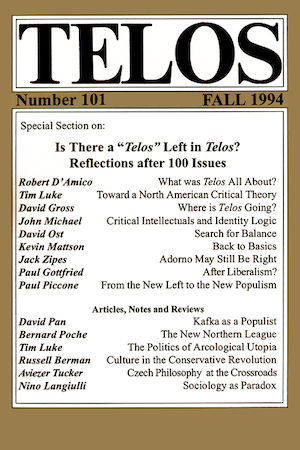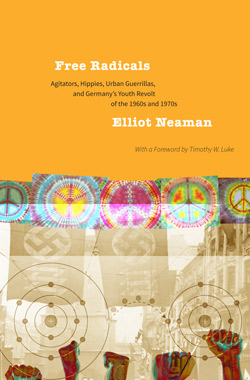By Florindo Volpacchio · Wednesday, December 28, 2022 If a journal manages to survive for 100 issues, it is reasonable to assume that the editorial board has managed to reach some sort of internal consensus and can finally rest on its laurels. Such is not the case with Telos. . . . After all these years, nothing seems to be settled and [Telos] remains a hopelessly heterogeneous group still trying to come to some agreement concerning many crucial and not-so-crucial issues. . . . This is why this theoretical bellum omnium contra omnes may be interpreted as evidence of lingering internal vitality, an unwillingness to take anything for granted, and a suspicion of all positions even faintly resembling conformism and passivity.
 With those words from Telos 101 (Fall 1994), Paul Piccone launched his critique of those who felt Telos had lost its direction and had settled into the role of the cranky old uncle of intellectual journals. Having just celebrated its 200th issue in its 54th year, those words still speak to the current state of the intellectual project he launched back in 1968. With those words from Telos 101 (Fall 1994), Paul Piccone launched his critique of those who felt Telos had lost its direction and had settled into the role of the cranky old uncle of intellectual journals. Having just celebrated its 200th issue in its 54th year, those words still speak to the current state of the intellectual project he launched back in 1968.
Piccone’s critique of his critics, “From the New Left to the New Populism,” was intended not to lay claim to any settled doctrine for Telos but to demonstrate the journal’s ability to constantly rethink its position among current debates along the entire ideological spectrum. While the bellum omnium contra omnes Piccone refers to in his article specifically refers to Telos‘s own family, I think it is more than fair to say it was applied to any and all who asserted a suspicious and artificial ground for emancipation. Toward this end, Piccone begins by providing his own critique of the Western Marxist tradition out of which Telos arose. This in itself, in its pure compactness, is a tour de force of intellectual history and should be read by all those who seek an origin story, or who simply need to have their revision revised.
Continue reading →
By Telos Press · Monday, November 7, 2016  “There were actually at least two countercultures in 1968. The street mutineers dreamed of a political revolution, which was acted out as theater, using old scripts. In the second, politics became personal; emancipation came in the form of consumer choices. The first was collectivist and failed, the second was libertarian, individualistic, futuristic, and carried the day. In the United States Stewart Brand, the visionary who founded The Whole Earth Catalog in 1968, pithily described the difference as between ‘Berkeley and Stanford’: ‘Around Berkeley, it was Free Speech Movement, “power to the people.” . . .’ In Germany this kind of technology-as-revolution mindset was much more difficult to launch, given the entrenched romantic aversion to technology in the counterculture. . .” “There were actually at least two countercultures in 1968. The street mutineers dreamed of a political revolution, which was acted out as theater, using old scripts. In the second, politics became personal; emancipation came in the form of consumer choices. The first was collectivist and failed, the second was libertarian, individualistic, futuristic, and carried the day. In the United States Stewart Brand, the visionary who founded The Whole Earth Catalog in 1968, pithily described the difference as between ‘Berkeley and Stanford’: ‘Around Berkeley, it was Free Speech Movement, “power to the people.” . . .’ In Germany this kind of technology-as-revolution mindset was much more difficult to launch, given the entrenched romantic aversion to technology in the counterculture. . .”
Continue reading →
By Telos Press · Monday, October 31, 2016 “The idea of a revolutionary, ‘post-materialistic’ subject, personified by marginal actors, was popularized by Jean-Paul Sartre, who viewed outcasts and criminals, like the writer and petty criminal Jean Genet, as enlightened critics of bourgeois society. In Germany, Frankfurt School theorists like Claus Offe proposed that in ‘late capitalism’ ever more social groups—the unemployed, the mentally ill, the lawbreakers—would be pushed to the margins and could eventually pose a real threat to the social order. The problem, as one wit put it, was that ‘late capitalism’ kept arriving too late.”
—Elliot Neaman, Free Radicals: Agitators, Hippies, Urban Guerrillas, and Germany’s Youth Revolt of the 1960s and 1970s
Continue reading →
By Telos Press · Monday, October 24, 2016 “The spectacular Baader escape and the RAF media campaign against the West German state now caught the attention of the Stasi. Wanted posters advertising a reward of 10,000 DM with Meinhof’s photo were pasted ubiquitously in public spaces all across Western Germany. In the early afternoon of August 17, Meinhof surfaced in East Berlin wearing dark sunglasses, knocking at the door of the FDJ headquarters. She asked to be put in touch with the Stasi and mentioned Werner Lamberz and Horst Schumann, two functionaries she had known from an earlier meeting with the FDJ. She viewed East Germany as a promising base from which to launch attacks on the Federal Republic, or at least as a safe haven for when her troop came under surveillance pressure. At first, the Stasi decided not to take any risks with this unknown crowd, but Erich Mielke, longtime head of the Stasi, changed his mind, and on August 20, 1970, orders were given that Meinhof be allowed access to East Germany ‘when she wishes.’ As we have seen repeatedly, the Stasi always played with the idea of using the APO and the student rebellion as a weapon in the fight to destabilize West Germany, and this opportunity looked too promising to ignore…”
Continue reading →
By Telos Press · Monday, October 17, 2016 “From the summer until November 1969, Baader and Ensslin threw themselves into their project with enthusiasm and were soon put in charge by the naïve and often intimidated authorities. Under Baader and Ensslin’s guidance, around forty girls and boys (nicknamed ‘picos’) fled Staffelberg, and runaways from various other juvenile centers soon joined them. They found sanctuary in various and sundry apartments in the Frankfurt area, arranged by local activists. Baader and Ensslin staged ‘go-ins’ in the offices of the nervous bureaucrats who ran the homes and succeeded in convincing the experts to make changes to the living conditions before the young residents would promise to return. Baader and Ensslin were given power to manage the five DM cash allotment for each youth, which turned out, unsurprisingly, to be a bad mistake…”
Continue reading →
By Telos Press · Monday, October 3, 2016 Elliot Neaman’s Free Radicals: Agitators, Hippies, Urban Guerrillas and Germany’s Youth Revolt of the 1960s and 1970s is now available for purchase in our online store. Save 20% on the list price by using the coupon code BOOKS20 during the checkout process. Also available in ebook format at Amazon.com (Kindle) and Barnes & Noble (NOOK).
Free Radicals
Agitators, Hippies, Urban Guerrillas, and Germany’s
Youth Revolt of the 1960s and 1970s
 by Elliot Neaman by Elliot Neaman
With a Foreword by Timothy W. Luke
Elliot Neaman’s Free Radicals presents a comprehensive panorama of the West German youth revolt in the 1960s, as well as its subsequent fragmentation and descent into terrorism in the 1970s. Neaman argues that the activists of the 1960s fundamentally misconstrued the nature of the young German republic, conflating it with earlier problematic German polities, and offered hazy world-shattering utopias to replace it based on artificial historical comparisons. The student radicals at first were swept along by liberalizing forces, but then made a decisive turn against reform in favor of an aggressive rejection of the existing order.
Continue reading →
|
|
 With those words from Telos 101 (Fall 1994), Paul Piccone launched his critique of those who felt Telos had lost its direction and had settled into the role of the cranky old uncle of intellectual journals. Having just celebrated its 200th issue in its 54th year, those words still speak to the current state of the intellectual project he launched back in 1968.
With those words from Telos 101 (Fall 1994), Paul Piccone launched his critique of those who felt Telos had lost its direction and had settled into the role of the cranky old uncle of intellectual journals. Having just celebrated its 200th issue in its 54th year, those words still speak to the current state of the intellectual project he launched back in 1968. 


